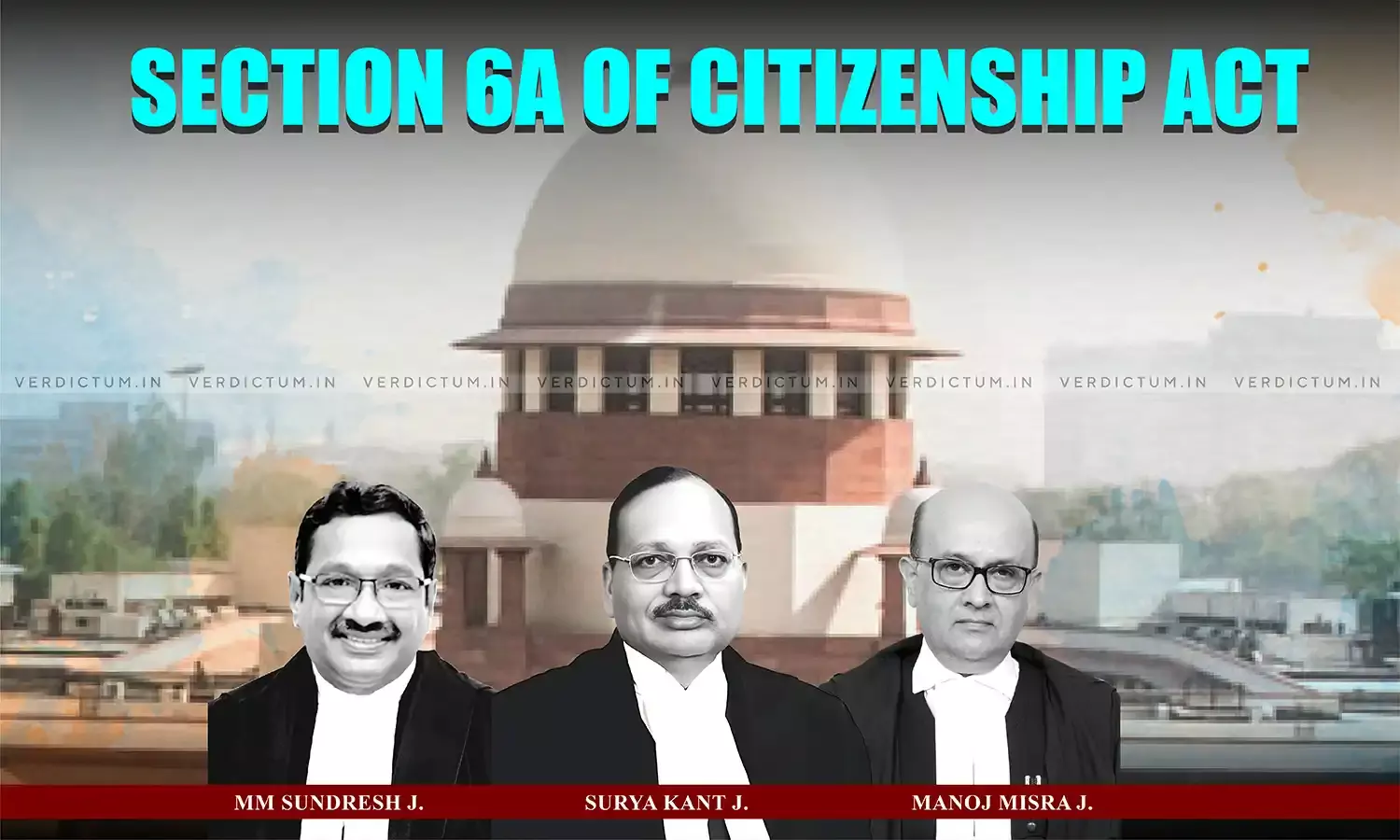Fundamental Right Under Article 29(1) Constitution Not Restricted To Minorities; Any Group Can Seek To Conserve Their Distinct Language, Script, Or Culture: SC
The Supreme Court of India, in its judgment which upheld the constitutional validity of Section 6A of the Citizenship Act, delved into the interpretation and scope of Article 29(1) of the Constitution, that guarantees the right of any section of citizens to conserve their distinct language, script, or culture.
The Judgment authored by Justice Surya Kant, also on behalf of Justice MM Sundresh, and Justice Manoj Misra explored how Article 29(1) extends beyond the technical definition of "minorities," granting protection to cultural groups regardless of their size or demographic status.
"Article 29(1) begins with the term ‘any section of citizens’. Though the term ‘minority’ is used in the marginal heading, the scope of Article 29(1) is not restricted to minorities as understood in the technical sense.It instead extends to any section of citizens residing in the territory of India," the judgment noted.
In his concurring opinion, CJI DY Chandrachud observed: "Article 29 applies to non-minorities as much as it applies to minorities, provided that (a) the section is of citizens; and (b) that section has a distinct language, script or culture.155 The right that is granted to this beneficiary class is the right to ‘conserve’ their language, script or culture.."
The Court stated that the framers of the Constitution, including Dr. B.R. Ambedkar, emphasized the need for safeguarding not only recognized minority groups but also citizens migrating between states with distinct cultural practices. The provision was designed to ensure that local or state interference does not erode these unique cultural identities.
The Bench said, "Article 29(1) effectively has two key aspects that need to be determined: first, whether there is a 'section of citizens’ seeking to conserve their language, script or culture and second, that such language, script or culture in question is ‘distinct’.....Thus, Article 29(1), while conferring the right to conserve, does not restrict itself only to the notion of a minority as understood in the technical sense but includes any group that may seek to conserve a distinct language, script, or culture".
The Court referred to international precedents where similar cultural preservation rights exist, such as the Constitutions of Albania, Armenia, and Poland, noting that the concept of cultural conservation is universal, though the degree of state involvement differs across jurisdictions. "Provisions akin to Article 29(1), which establish a right to preserve culture, can be identified in numerous Constitutions across various jurisdictions. For instance, Article 20(2) of the Constitution of Albania grants the right to 'preserve and develop' ethnic, cultural, and linguistic identity. A similar right is articulated in Article 56 of the Armenian Constitution, Article 11 of the Georgian Constitution, Article 59 of the Kosovan Constitution, Article 114 of the Latvian Constitution, and Article 35(1) of the Polish Constitution. While these provisions share the common objective of cultural preservation, they vary slightly from Article 29(1) by incorporating the term 'develop'," the Court said.
The Bench also emphasized that while Article 29(1) restricts state interference, it does not impose a duty on the government to actively promote or develop a group's language, script, or culture. The Court also pointed out that minimal or incidental state regulations that do not directly curtail cultural rights may not violate Article 29(1).
"The Petitioners in the present case allege a violation of their right specifically under Article 29(1). This article aims to protect and guarantee the right conferred upon every citizen of India to conserve their language, script or culture. When read in conjunction with Article 30, the overarching objective of Article 29 is to allow minority communities to establish educational institutions to preserve and fortify their cultural, linguistic, or scriptural heritage. However, given the specific allegations presented by the Petitioners, our scrutiny will be confined exclusively to assessing a potential violation of Article 29(1)," it said.
The Court reiterated that Article 29(1) affords cultural groups the right to preserve their heritage but does not compel the State to provide affirmative measures for its protection. Instead, the article ensures that no law or action by the State imposes an external culture on any section of citizens. "Article 29(1) aims to ‘conserve’ the language, culture or script of a section of citizens. Instead of obligating the State to make any special provisions for the development of such language, script, or culture, the ambit of the term ‘conserve’ is to prohibit state intervention in these aspects. This intent to proscribe interference, though not apparent, has been explicitly emphasized in the discussions of the Constituent Assembly and has consistently been underscored by this Court in various decisions," the Bench said.
The Bench further said, "A violation of Article 29 therefore hinges on the ‘nature’ and ‘degree’ of State intervention and not merely on the simpliciter fact of intervention. In other words, the violation of Article 29 is necessarily a question of law which requires adjudication of the circumstances, intention, and effect of the state intervention on the aggrieved section of citizens, as well as the society at large."
Conclusively, the Court observed, "The rights conferred by Article 29(1) require that the State not take any steps to erode a community's culture, language or script; and concomitantly accords to such sections of citizens the freedom and independence to preserve and conserve their culture, language and script, by themselves. At the same time, the right under Article 29(1) does not necessitate the Government to enact specific provisions for its enforcement and also does not altogether restrict the State from enacting regulations."
Cause Title: In Re Section 6A of the Citizenship Act 1955 [Neutral Citation No. 2024 INSC789]












